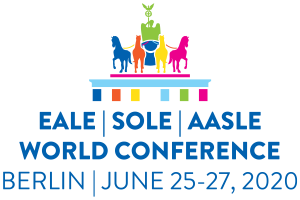EALE SOLE AASLE World Conference 2020
The virtual joint EALE SOLE AASLE conference offers four session types for academic exchange.
-
1. Plenary Sessions, confirmed keynote speakers
• Jessica Pan, National University of Singapore (AASLE: Bob Gregory Lecture)
• Michael Keane, University of New South Wales (SOLE: Al Rees Lecture)
• Petra Todd, University of Pennsylvania (SOLE: Fellows Lecture)
• James Heckman, University of Chicago (IAB – Sponsored Lecture)
• Erik Plug, University of Amsterdam (EALE: Frisch-Tinbergen Lecture)
-
2. Invited Sessions
Invited sessions involve four presentations on a topical issue in labour economics. The session lasts for 90 minutes and each speaker will have about 18-20 minutes for presentations, leaving room for a short discussion. Invited sessions typically features a mix of speakers from all parts of the world.
-
3. Parallel Flash Talk Sessions
For parallel sessions, we will have a uniform format for presentations. All participants will be included in parallel sessions featuring flash talk presentations. This also applies to papers initially accepted for poster presentations.
In a flash talk, the presenter has a maximum of 3 slides. A flash talk presentation takes 10 minutes for presentation and a short discussion. At the end of the session, after all flash talks have taken place, there will be time for general discussion among those in the audience who would like to stay and engage.
In longer presentations, economists are used to demonstrating that results are interpreted via economic theory, that best possible data are used, that state of the art scientific methods are used etc.
In contrast, in a Flash Talk the emphasis is on focusing on the most pertinent components of the research project: the main aim of the project and its most important findings. The Flash Talk should stimulate the audience to read your paper and to get in contact with you to talk about details of your project, either in the discussion part of the session or later.
At the end of all presentations, we reserve 30 minutes for additional discussion. We aim to include six presentations in 90 minutes. The scientific chairs will enforce the time/slide rule vigorously and will initiate and structure the scientific discussion.
A long list of senior researchers have already confirmed to act as scientific session chairs .
-
4. Network Sessions
Online format in which the networking session chair will meet you in a virtual room, together with a couple of other conference participants, and talk about a topic of the chair’s expertise field. We view it as an opportunity for PhD students and junior participants to get to talk to senior labor economists.
The participants of networking sessions should be prepared to:
• Give a concise description of their current research in 2-3 minutes (e.g. what is the main research question? Where does it fit in the literature? What’s its contribution?)
• Ask the networking session host 1-2 questions.The following researchers have already confirmed to host a networking session (we get more confirmations on a daily basis and will update the list accordingly).
Networking hosts and their topics:
• John Abowd (Cornell University): Using confidential government micro-data for labor market research
• Joseph Altonji (Yale University): Education
• Josh Angrist (MIT): Good questions, feasible research designs: ask Master Joshway
• David Autor (MIT) : Technological change and labor markets
• Sandy Black (Columbia University): Intergenerational mobility
• Sascha Becker (Monash University): Economic history, Force migration
• Leah Boustan (Princeton University): Immigration
• Janet Currie (Princeton University): The economics of children and families
• Pierre Cahuc (Sciences Po): 1. Employment protection legislation. 2. Short-time work. 3. Part-time unemployment insurance
• Thomas Dohmen (University of Bonn): Incentives and sorting
• Christian Dustmann (University College London and CReAM): Migration
• Bob Gregory, (Australian National University): Can we make sense of the evolution of coronavirus and economic policy? The role of facts, models and experts
• Andrea Ichino (European University Institute): Education
• Daiji Kawaguchi (Hitotsubashi University): The effect of new technology on employment
• Kevin Lang (Boston University): Economics of racial discrimination
• Jungmin Lee (Seoul National University): Minimum wages
• Warn N. Lekfuangfu (Universidad Carlos III de Madrid): childhood inequality (e.g. family resources, skills; aspirations); labour market in developing countries; empirical political economy; subjective expectations
• Sholeh Maani (The University of Auckland): Migration, Education, Labour market impacts of covid-19
• Alan Manning (London School of Economics and Political Science): Monopsony
• Robert Moffitt (Johns Hopkins University): Transfer programs
• Jessica Pan (National University of Singapore): Gender-related issues
• Abigail Payne (The University of Melbourne) Addressing entrenched disadvantage (or poverty). Can add a covid-19 flavour.
• Barbara Petrongolo (Queen Mary University of London) : Gender inequalities
• Erik Plug (University of Amsterdam): Family economics
• Kjell Salvanes (Norwegian School of Economics): Intergenerational mobility- may focus on human capital. Early childhood development
• Uta Schönberg (University College London and CReAM): Inequalities in the labor market
• Kathryn Shaw (Stanford University): New work on Artificial Intelligence, including Covid ideas
• Jeffrey Smith (University of Wisconsin): University quality
• Junsen Zhang (Chinese University of Hong Kong): Family economicsPlease note that we are aware that time zone differences of participants are a major challenge for an international virtual event. Be assured that we make an active effort to deal with this challenge when making the program.

